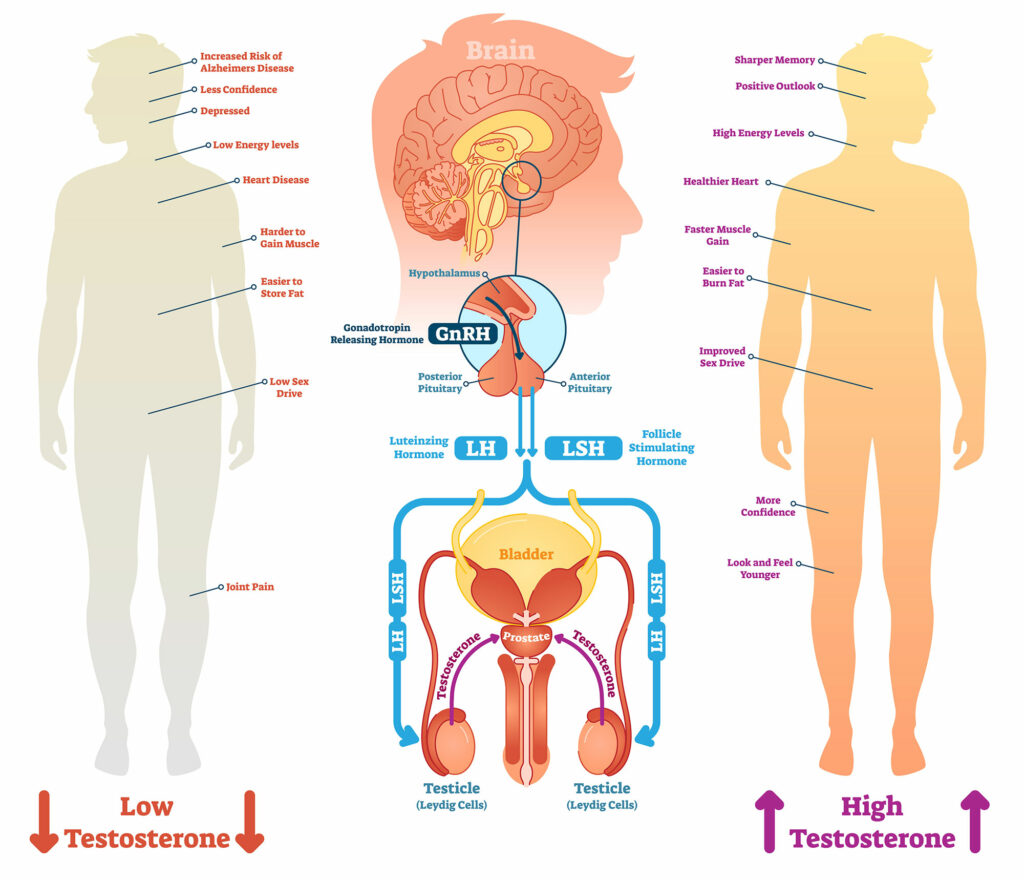Home » Conditions » Low Testosterone
Low Testosterone
Male Hypogonadism
The accepted low blood testosterone in men is less than 300 nanograms per deciliter for adults. It can affect men at any age from birth to adulthood. It is a condition in which your testicles do not produce enough testosterone. Testosterone stimulates the development of male characteristics as well as being essential for sperm production. It helps maintain sex organs, muscle mass, bone density, red blood cells and is important in the sexual and reproductive function.
Testosterone levels are higher in the early part of the day and declines throughout the day. Studies suggest that about 2% of the male population suffers from low testosterone. Other research has indicated that more that 8% of people from 50 to 79 years old have low testosterone.
Symptoms of low testosterone varies depending upon the age when the condition occurs. Typical signs that seem to suggest low testosterone include:
- Lowered sex drive
- Loss of armpit and/or pubic hair
- Shrinking testicles
- Low or zero sperm count
- Hot flashes
Other symptoms may include:
- depressed mood
- increased body fat
- decrease in muscle mass or strength
- decreased endurance
- enlarged male breast tissue
Symptoms of low testosterone in children
Low testosterone in children before or during puberty include:
- Slowed growth in height
- Reduced development of pubic hair
- Reduced growth in testicles or penis
- Less deepening of their voice
- Lower than average strength and endurance
There are a few causes of low testosterone in men. Primary male hypogonadism occurs when there is something wrong with the testicles that do not allow them to make the normal levels of testosterone. Congenital factors include absence of testicles, undescended testicles, underdevelopment of the Leydig cells in your testicles as well as certain genetic conditions and disorders.
Acquired conditions that may affect your testicles include injury, removal, inflammation or other damage. Chemotherapy or radiation therapy to your testicles or use of anabolic steroids.
Secondary causes of low testosterone includes conditions that affect the hypothalamus and/or pituitary gland that controls your hormone levels that regulate testosterone production in your testicles.
After diagnosis of low testosterone, we will treat your condition with testosterone replacement therapy. There are several different forms for testosterone replacement therapy that includes skin gels, oral medications, testosterone injections, intranasal spray gels and pellets that are placed in fatty tissues under your skin in the hip or buttocks area.
Each patient is unique and certain tests must be performed to first determine that a low testosterone condition exists, its possible root cause and the treatment that best fits your lifestyle.
How we can help
Austin Urological Associates can help men with low testosterone. A large portion of the population especially among older men suffer from low testosterone levels that will also affect other aspects of your life as well as your health. Effective treatment is available. At Austin Urological Associates, we screen patients to determine the cause of the low testosterone and offer treatments that will help them get back to normal everyday life. Contact us for an appointment at (512) 476-6060
Need more info? Contact us
If you need more information about a condition or one of our procedures, please call us during normal business hours or use this form 24/7.
"*" indicates required fields
If this is an emergency, please do not use this form. Call 911 in case of emergencies or contact us at (512) 476-6060 for urgent matters.

